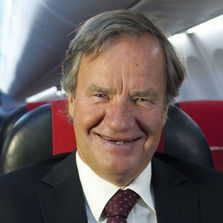
Armed finally with U.S. Department of Transportation
approval to increase service to the U.S., Norwegian Air Shuttle, already a
disruptor on transatlantic routes, is shaking up that business-travel-heavy
market even more. The low-cost carrier, started by CEO Bjorn Kjos after the end
of Norwegian airline Busy Bee in the early 1990s, has been flying between
Europe and the U.S. on Boeing 787 Dreamliner aircraft for several years. This
year, Norwegian also began service from Ireland to two smaller East Coast airports—Stewart
International Airport, north of New York, and Providence, R.I.—on single-aisle
Boeing 737 Max aircraft. It's the first carrier to introduce smaller jets to
transatlantic flights. In all, the carrier has opened about 30 intercontinental
routes between Europe, the U.S. and Asia in the past year.
The increased capacity has been a factor in bringing
transatlantic fares to their cheapest point in years, and that has prompted
legacy carriers to adapt to compete. Delta has expanded its Basic Economy to
transatlantic flights, and Aer Lingus introduced a similar type of fare on its
transatlantic routes. American Airlines may introduce a basic economy fare on
its transatlantic flights next year. British Airways parent company
International Airlines Group, meanwhile, launched its own low-cost subsidiary,
Level, this year.
Norwegian's service on smaller aircraft, meanwhile, stands
to change the transatlantic market further, as the carrier can offer
connections to smaller markets. Other carriers considering transatlantic
service on single-aisle aircraft—JetBlue, among them—undoubtedly are monitoring
Norwegian's success on the new routes.
"Through a combination of new technology, regulatory
change and applying innovative strategies, Norwegian has irreversibly reshaped
the way airlines, low-cost and otherwise, look at their network opportunities,"
according to Peter Harbison, executive chairman of CAPA-Centre for Aviation,
which named Norwegian as Airline of the Year for 2017. "The demand is
there, and hopefully profitability will follow as Norwegian truly develops from
its roots as a European regional airline into a global airline and recognized
brand across the world."
While its no-frills, low fares draw leisure
travelers more than business travelers, Norwegian is not ignoring the corporate
market. It's expanding premium seating on its widebody aircraft for U.S.
flights, in part because of large demand from corporate travelers seeking lower
prices on premium service, according to Kjos. "It's been very attractive
for business people," Kjos told BTN. "We are attracting the smart
business people who are taking the cost benefit."